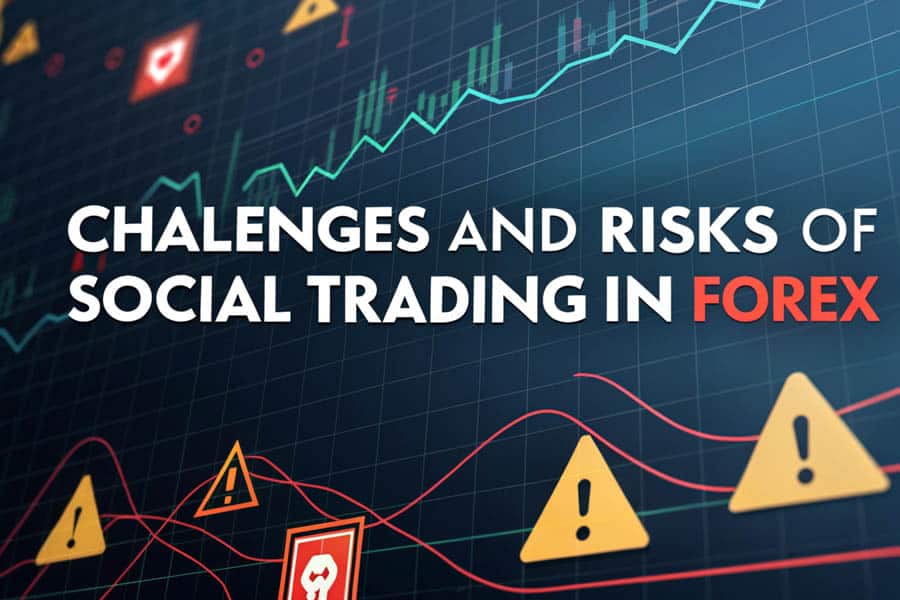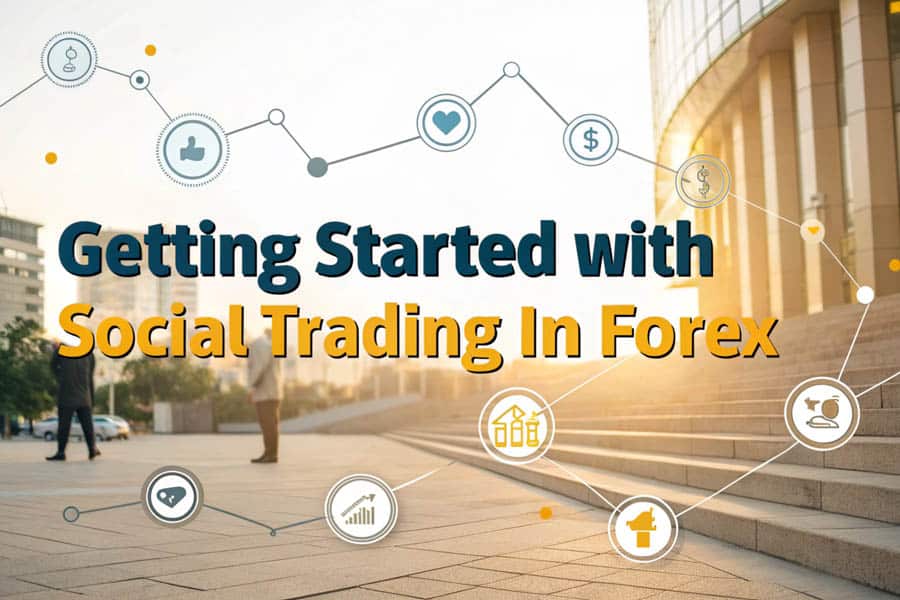Imagine harnessing the collective intelligence of thousands of traders to elevate your forex trading strategy. What is social trading in forex?
This transformative approach is reshaping the forex landscape by enabling traders to collaborate, share insights, and replicate successful strategies in real-time. In this comprehensive guide, we delve deep into the intricacies of social trading in forex, uncovering its mechanisms, benefits, strategies, and potential risks. Whether you’re a novice seeking guidance or an experienced trader aiming to diversify your portfolio, understanding social trading can significantly enhance your trading performance and success. Many traders rely on an online forex broker to access social trading platforms, allowing them to connect with a community of traders and improve their strategies.

What is Social Trading in Forex?
Social trading in forex is an innovative trading methodology that allows individuals to observe, interact with, and replicate the trading strategies of other forex traders. Unlike traditional trading, where decisions are made in isolation, social trading leverages the power of community to inform and execute trades. This collaborative environment is facilitated by specialized social trading forex platforms, which integrate social networking features with trading functionalities, creating a dynamic and interactive trading experience.
The Evolution and Popularity of Social Trading
The concept of social trading emerged as a response to the growing demand for more transparent and community-driven trading environments. With the rise of online forex brokers and advancements in technology, traders now have unprecedented access to real-time data, diverse trading strategies, and a global network of trading peers. This accessibility has fueled the popularity of social trading, making it an attractive option for both beginners and seasoned traders looking to enhance their trading capabilities.
Social trading’s rapid ascent in the forex market is underscored by its ability to democratize trading knowledge, allowing individuals to learn from each other and make informed trading decisions based on collective expertise. According to recent statistics, social trading accounts for a significant portion of retail forex trading volume, highlighting its growing influence and adoption worldwide.
How Social Trading Works in Forex

Understanding how social trading works in forex is essential for leveraging its full potential. Social trading platforms act as the central hub where traders connect, share insights, and replicate each other’s trades. Let’s explore the key components that make social trading a powerful tool for forex traders.
The Mechanics of Social Trading Platforms
At the core of social trading are social trading forex platforms, which serve as the bridge connecting traders. These platforms offer a range of features designed to facilitate interaction and collaboration among users. Here’s how they work:
- Trader Profiles and Performance Metrics: Each trader on the platform has a detailed profile showcasing their trading history, performance metrics, and strategies. This transparency allows users to evaluate and select traders to follow based on their past performance and trading style.
- Following and Copying Trades: Users can follow traders whose strategies align with their own investment goals. By opting to copy a trader, the platform automatically replicates their trades in real-time, proportionally adjusting the user’s portfolio based on the trader’s actions.
- Interactive Community Features: Social trading platforms often include forums, discussion boards, and chat functionalities where traders can exchange ideas, discuss market trends, and collaborate on trading strategies. This fosters a sense of community and continuous learning.
The seamless integration of social networking and trading functionalities on these platforms transforms forex trading into a more engaging and informed activity, enabling users to benefit from the collective knowledge and expertise of the trading community.
The Process of Copying Trades and Strategies
One of the standout features of social trading is the ability to copy trades directly from successful traders. Here’s a step-by-step breakdown of how this process typically works:
- Selection of a Trader to Follow: Users browse through trader profiles, assessing their performance metrics, trading history, and strategies. Factors such as return on investment (ROI), drawdown, and consistency are crucial in making an informed decision.
- Allocation of Funds: Once a trader is selected, users allocate a portion of their investment capital to copy that trader’s activities. This allocation is proportional, meaning that the user’s portfolio will mirror the trader’s trades based on the amount invested.
- Automated Trade Replication: As the followed trader executes trades, the platform automatically replicates these trades in the user’s account in real-time. This automation ensures that the user benefits from the trader’s strategies without the need for manual intervention.
- Ongoing Monitoring and Adjustment: Users can monitor the performance of the copied trades and make adjustments as needed. This includes reallocating funds, stopping the copying of underperforming traders, or diversifying by following multiple traders with different strategies.
The automated nature of copying trades not only simplifies the trading process but also reduces the emotional stress associated with making trading decisions, as it relies on proven strategies and disciplined execution.
Read More: Social Trading vs Copy Trading
The Role of Social Networks in Trade Discussions and Idea Sharing
Beyond the mechanics of copying trades, social trading forex platforms incorporate robust social networking features that enhance the overall trading experience. These features include:
- Discussion Forums and Chat Rooms: Traders can participate in real-time discussions, sharing insights, strategies, and market analyses. These interactions foster a collaborative learning environment where traders can gain diverse perspectives and refine their approaches.
- Idea Sharing and Collaborative Strategies: Users can share trading ideas and collaborate on developing new strategies. This collective brainstorming can lead to innovative trading methodologies and improved decision-making.
- Educational Resources and Webinars: Many platforms offer educational content, including webinars, tutorials, and articles, helping traders enhance their knowledge and skills through community-driven learning.
The integration of social networks within trading platforms transforms forex trading from a solitary activity into a community-driven endeavor, promoting continuous improvement and adaptability among traders.
Benefits of Social Trading in Forex

Social trading in forex offers a multitude of benefits that cater to the diverse needs of traders. From enhancing learning opportunities to providing robust risk management tools, social trading platforms empower users to optimize their trading strategies and achieve their financial goals.
Access to a Community of Traders
Engaging with a community of traders provides unparalleled opportunities for idea exchange and learning. Social trading platforms connect individuals with a diverse group of traders, each bringing unique trading styles, market perspectives, and innovative strategies. This exposure accelerates the learning process, enabling traders to adopt best practices, avoid common pitfalls, and continuously improve their trading skills.
Transparency in Trading Histories and Performance Metrics
One of the key benefits of social trading in forex is the transparency it offers. Social trading platforms provide detailed performance metrics for each trader, including ROI, drawdown, trading frequency, and historical performance data. This transparency allows users to make informed decisions when selecting traders to follow, ensuring alignment with their investment goals and risk tolerance.
Transparency builds trust, ensuring that users can confidently follow traders who consistently demonstrate success and adhere to sound trading principles.
Opportunities for Portfolio Diversification
Diversifying your portfolio is crucial for managing risk, and social trading facilitates this by enabling you to follow multiple traders with different strategies. By spreading investments across various methods, traders can mitigate the impact of any single trade’s performance on their overall portfolio, enhancing stability and growth potential. This diversification is particularly beneficial in the highly volatile forex market, where market conditions can change rapidly.
User-Friendly Platforms for Beginners
Social trading platforms are designed with user-friendliness in mind, making them accessible to beginners who may be intimidated by traditional trading interfaces. Intuitive dashboards, automated features, and comprehensive tutorials simplify the trading process, allowing new traders to participate confidently and effectively. This ease of use lowers the entry barrier, empowering more individuals to engage in forex trading without extensive prior experience.
Cost-Effectiveness Compared to Traditional Mentoring
Traditional trading mentorship can be expensive and time-consuming, whereas social trading offers a cost-effective alternative. Many platforms provide free access to basic features, with premium options available for those seeking advanced tools and exclusive content. This affordability democratizes access to high-quality trading education and strategies, enabling more traders to benefit from expert insights without the financial burden.
Time-Saving Aspects
By relying on the analyses and trades of experienced traders, users can save significant time that would otherwise be spent on market research and trade execution. This efficiency allows traders to focus on other important aspects of their lives while still participating actively in the forex market. Time-saving aspects of social trading are particularly valuable for individuals balancing multiple commitments, ensuring they can engage in trading without compromising other responsibilities.
Flexibility in Setting Risk Management Parameters
Social trading platforms often allow users to customize their risk management settings, such as setting stop-loss limits and adjusting the proportion of their portfolio allocated to different traders. This flexibility ensures that users can tailor their trading activities to align with their individual risk tolerance levels. By setting personalized risk parameters, traders can effectively manage potential losses and optimize their investment strategies.
Read More: What is Copy Trading in Forex?
Challenges and Risks of Social Trading in Forex

While social trading in forex offers numerous benefits, it is not without its challenges and risks. Understanding these potential pitfalls is essential for traders to make informed decisions and mitigate associated risks effectively.
Potential Risks of Following Underperforming Traders
Not all traders on social platforms are successful, and following underperforming traders can lead to financial losses. It’s essential to thoroughly evaluate a trader’s performance history before deciding to copy their trades. Metrics such as ROI, consistency, and risk management practices should be scrutinized to identify traders with a proven track record of success.
Over-Reliance on Others
Relying too heavily on others for trading decisions can hinder the development of personal trading skills. While social trading provides valuable insights, it is important to balance reliance on others with independent analysis and decision-making. Developing personal trading skills ensures long-term success and resilience in the face of market volatility.
Limited Control Over Trades
When copying trades, users have limited control over individual trade executions. This lack of control can be problematic if the trader’s strategy doesn’t align with your personal investment goals or risk tolerance, potentially leading to mismatched outcomes. It’s crucial to regularly monitor copied trades and adjust settings as needed to maintain alignment with your financial objectives.
Technical Issues Affecting Trade Executions
Technical glitches and platform downtimes can disrupt trade executions, potentially leading to missed opportunities or unintended losses. Choosing a reliable and well-maintained platform is crucial to mitigate these risks. Additionally, having contingency plans in place, such as setting alerts or diversifying across multiple platforms, can help manage the impact of technical issues.
Limited Customization Options
Some social trading platforms offer limited options for customizing trade settings, which can restrict users from tailoring their trading activities to their specific needs and preferences. This limitation can reduce overall trading effectiveness, especially for traders seeking a high degree of customization in their strategies. Evaluating platform features before committing is essential to ensure they meet your trading requirements.
Competition Among Traders
High competition on social trading platforms can lead to increased market volatility and higher risks, especially if multiple users are copying the same successful traders. This saturation can dilute the effectiveness of popular strategies and elevate market risks. Diversifying the traders you follow and employing unique strategies can help mitigate the impact of high competition.
Regulatory Concerns and Potential Exposure to Fraud
The decentralized nature of social trading platforms can expose users to regulatory challenges and the risk of fraudulent activities. Ensuring that the platform is regulated by reputable authorities can help mitigate these risks and provide a safer trading environment. Regulatory compliance is a critical factor in safeguarding your investments and ensuring fair trading practices.
Read More: Copy Trading vs Signals
Types of Social Trading Strategies
Social trading encompasses a variety of strategies, each catering to different trading preferences and risk appetites. Understanding these strategies can help traders select the most suitable approach for their financial goals.
Copy Trading
Copy trading involves automatically replicating the trades of another trader in real-time. This strategy is ideal for those who prefer a hands-off approach, allowing their portfolio to mirror the performance of experienced traders without manual intervention. By selecting multiple traders to copy, users can diversify their investments and reduce reliance on a single trading strategy.
Mirror Trading
Mirror trading is similar to copy trading but focuses on mimicking predefined trading strategies rather than individual trader actions. This approach ensures consistency in the application of specific trading methodologies across your portfolio, providing a more strategic alignment with your investment goals. Mirror trading is suitable for traders seeking a structured and systematic approach to their trading activities.
Signal Trading
Signal trading involves receiving trade signals from experienced traders and executing trades manually based on those recommendations. This strategy offers a balance between automation and personal control, allowing users to apply their judgment while leveraging expert insights. Signal trading is ideal for traders who want to stay actively involved in their trading decisions while benefiting from professional guidance.
Hybrid Strategies
Some social trading platforms offer hybrid strategies that combine elements of copy trading, mirror trading, and signal trading. These hybrid approaches provide traders with greater flexibility and customization, enabling them to tailor their trading activities to their specific needs and preferences. Hybrid strategies can enhance trading effectiveness by leveraging the strengths of multiple social trading methodologies.
Getting Started with Social Trading in Forex

Selecting a Reputable Social Trading Platform
Choosing the right platform is crucial for a successful social trading experience. When selecting a social trading forex platform, consider the following factors:
- Regulation and Security: Ensure the platform is regulated by reputable authorities to safeguard your investments and maintain fair trading practices.
- User Interface and Experience: A user-friendly interface with intuitive navigation enhances the overall trading experience, especially for beginners.
- Performance Metrics and Transparency: Look for platforms that provide detailed performance metrics and transparent trader profiles to make informed decisions.
- Community Features: Platforms with robust community features, such as forums and discussion boards, facilitate better interaction and idea exchange.
- Fees and Commissions: Evaluate the platform’s fee structure to ensure it aligns with your trading budget and objectives.
Evaluating and Choosing Traders to Follow
Assessing potential traders to follow is a critical step in social trading. Here are key considerations:
- Historical Performance: Review the trader’s past performance, including ROI, consistency, and drawdown. Consistent performance over time is a positive indicator.
- Trading Style and Strategy: Understand the trader’s trading style (e.g., day trading, swing trading) and strategies to ensure they align with your investment goals.
- Risk Management Practices: Evaluate how the trader manages risk, including the use of stop-loss orders and diversification strategies.
- Transparency and Communication: Prefer traders who are transparent about their strategies and actively communicate with their followers, providing insights and updates.
Thoroughly evaluating traders helps you select those who are most likely to contribute positively to your trading portfolio.
Setting Risk Management Parameters
Effective risk management is essential for safeguarding your investments. Social trading platforms offer various tools to customize your risk management settings:
- Stop-Loss Limits: Set predefined loss limits to automatically close trades if they reach a certain level, preventing excessive losses.
- Investment Allocation: Determine the proportion of your portfolio allocated to each trader to diversify risk.
- Maximum Drawdown: Limit the maximum drawdown allowed for each trader to control potential losses.
Customizing risk management parameters ensures that your trading activities remain aligned with your risk tolerance and financial objectives.
Monitoring and Adjusting Copied Trades
Regularly reviewing your portfolio’s performance is vital to ensure that your social trading strategies remain effective. Here’s how to stay proactive:
- Performance Tracking: Use platform tools to monitor the performance of copied trades and overall portfolio growth.
- Adjusting Allocations: Reallocate funds based on the performance of individual traders, increasing investment in high-performing traders and reducing exposure to underperformers.
- Staying Informed: Keep abreast of market trends and news that may impact your copied trades, making necessary adjustments to your strategies.
Active monitoring and adjustment help maintain the effectiveness of your social trading approach and optimize your investment outcomes.
Pro Tips for Advanced Traders
For those looking to maximize the benefits of social trading in forex, here are some advanced strategies and insights:
- Diversify Your Following: Don’t rely on a single trader. Spread your investments across multiple traders with different strategies to minimize risk and enhance portfolio stability.
- Analyze Performance Metrics Deeply: Go beyond surface-level performance. Examine metrics like drawdown, consistency, trading frequency, and risk-adjusted returns to make informed decisions.
- Stay Informed and Adapt: Keep abreast of market trends, economic indicators, and geopolitical events that could impact the performance of the traders you follow. Adapt your strategies accordingly.
- Adjust Risk Settings Regularly: Update your risk management parameters based on the changing market landscape and your evolving investment goals. This ensures your trading remains aligned with your financial objectives.
- Engage with the Community: Actively participate in forums, discussions, and webinars to gain deeper insights and share your own experiences with other traders. This collaborative learning enhances your trading knowledge and skills.
- Leverage Advanced Tools and Analytics: Utilize the advanced tools and analytics provided by social trading platforms to gain deeper insights into trader performance and market trends. This data-driven approach can significantly enhance your trading decisions.
- Implement a Hybrid Trading Strategy: Combine elements of copy trading, mirror trading, and signal trading to create a customized trading approach that leverages the strengths of each strategy.
Implementing these pro tips can help advanced traders optimize their social trading strategies, enhancing their overall trading performance and achieving greater financial success.
Social Trading with Opofinance
When considering a regulated forex broker, Opofinance stands out as a premier choice, offering a comprehensive suite of services tailored to both novice and experienced traders. Here’s why Opofinance is a top contender in the social trading arena:
- ASIC Regulated: Ensures adherence to strict regulatory standards, providing enhanced security and reliability for your trading activities.
- Featured on the MT5 Brokers List: Recognized for its advanced trading platform compatibility, enabling seamless integration with MetaTrader 5 for superior trading experiences.
- Safe and Convenient Deposits and Withdrawals: Offers multiple secure methods to manage your funds effortlessly, ensuring quick and hassle-free transactions.
- Comprehensive Social Trading Services: Access to a vibrant community and advanced social trading tools, allowing you to connect, share, and replicate trades with ease.
- User-Friendly Interface: Designed for both beginners and experienced traders, ensuring intuitive navigation and ease of use across all features.
- Exclusive Trading Insights and Resources: Provides access to exclusive content, webinars, and trading resources to enhance your trading knowledge and skills.
Conclusion
Social trading in forex is revolutionizing the trading landscape by fostering a collaborative and transparent environment. It offers numerous benefits, including access to a community of traders, portfolio diversification, user-friendly platforms, and cost-effective trading solutions. However, it also presents challenges such as the potential for following underperforming traders and over-reliance on others. By understanding these dynamics and implementing effective strategies, traders can harness the power of social trading to enhance their forex trading endeavors and achieve greater financial success.
Key Takeaways
- Social trading leverages community insights to inform and execute forex trades, enhancing trading effectiveness.
- Benefits include access to experienced traders, transparency, portfolio diversification, and user-friendly platforms.
- Challenges involve potential risks from underperforming traders, over-reliance on others, and limited control over trades.
- Strategies such as copy trading, mirror trading, signal trading, and hybrid approaches cater to different trading preferences.
- Choosing a reputable platform and implementing effective risk management are crucial for success in social trading.
- Opofinance offers a secure and advanced social trading environment, making it a standout choice for traders seeking reliability and comprehensive trading tools.
How do social trading platforms ensure the security of my funds?
Social trading platforms implement robust security measures, including encryption, regulated accounts, and segregated client funds to protect your investments. Additionally, reputable platforms are regulated by financial authorities, ensuring adherence to strict security and operational standards. Always choose platforms that are regulated by reputable authorities to ensure maximum security for your funds.
Can I customize the trades I copy from other traders?
Yes, many social trading platforms offer customization options, allowing you to set parameters such as the proportion of your portfolio allocated to each trader, risk management settings, and trade limits. This customization ensures that the trades you copy align with your personal investment goals and risk tolerance, providing greater control over your trading activities.
What should I look for when selecting a trader to follow?
When selecting a trader to follow, consider their historical performance, risk management practices, trading style, and consistency. Additionally, review their trading history for transparency and ensure their strategies align with your financial objectives. Look for traders who demonstrate consistent performance, low drawdowns, and a disciplined approach to risk management.







